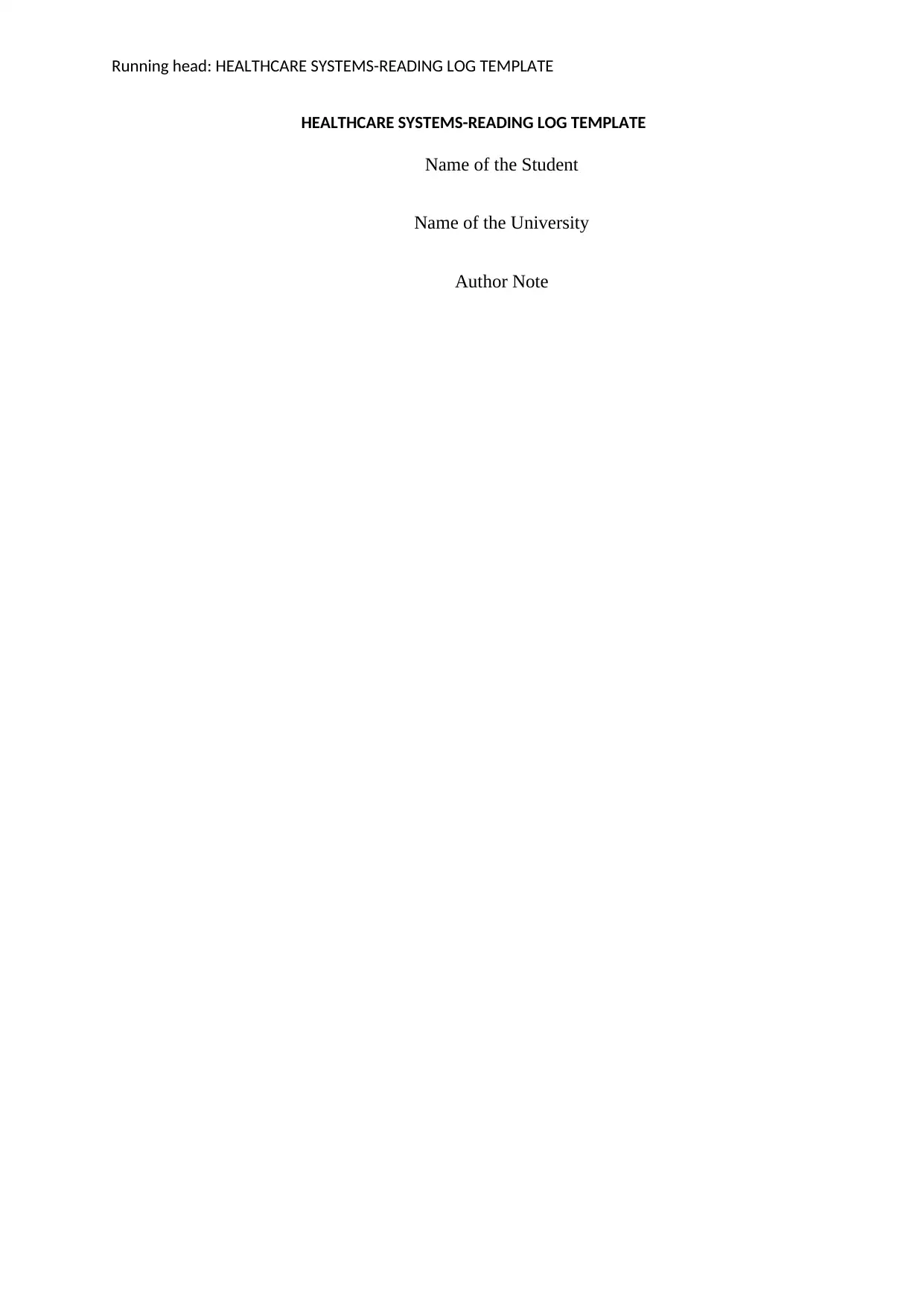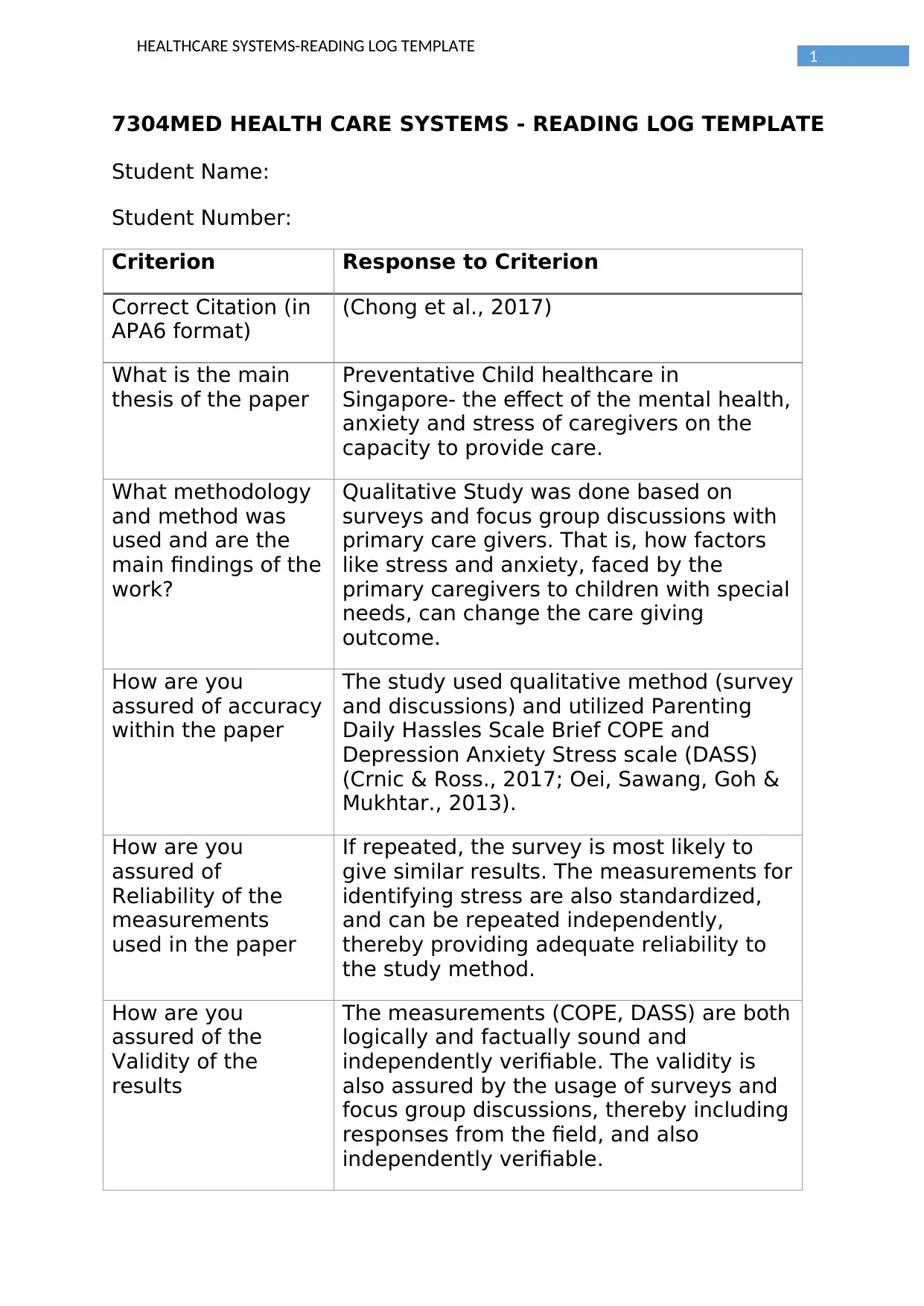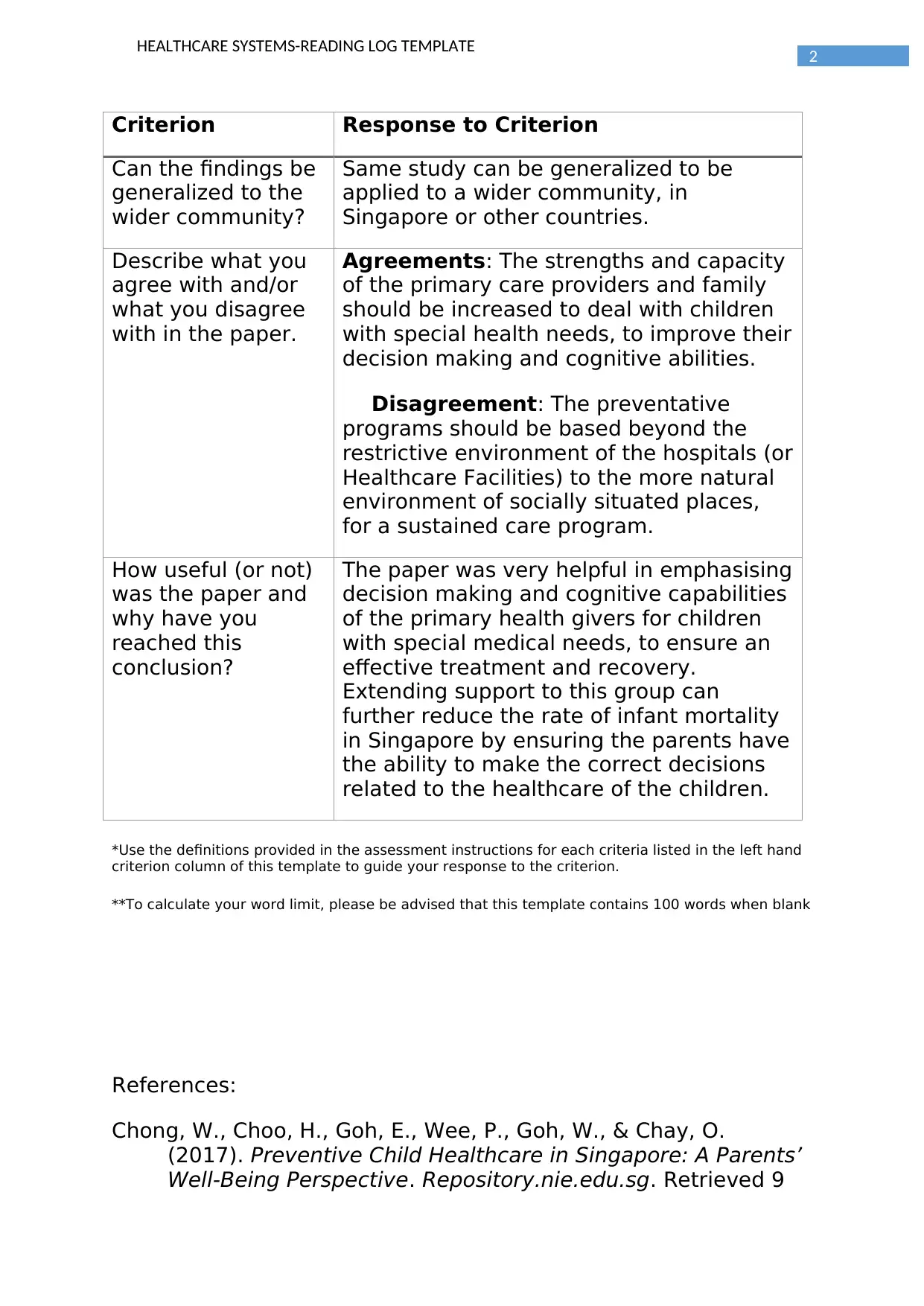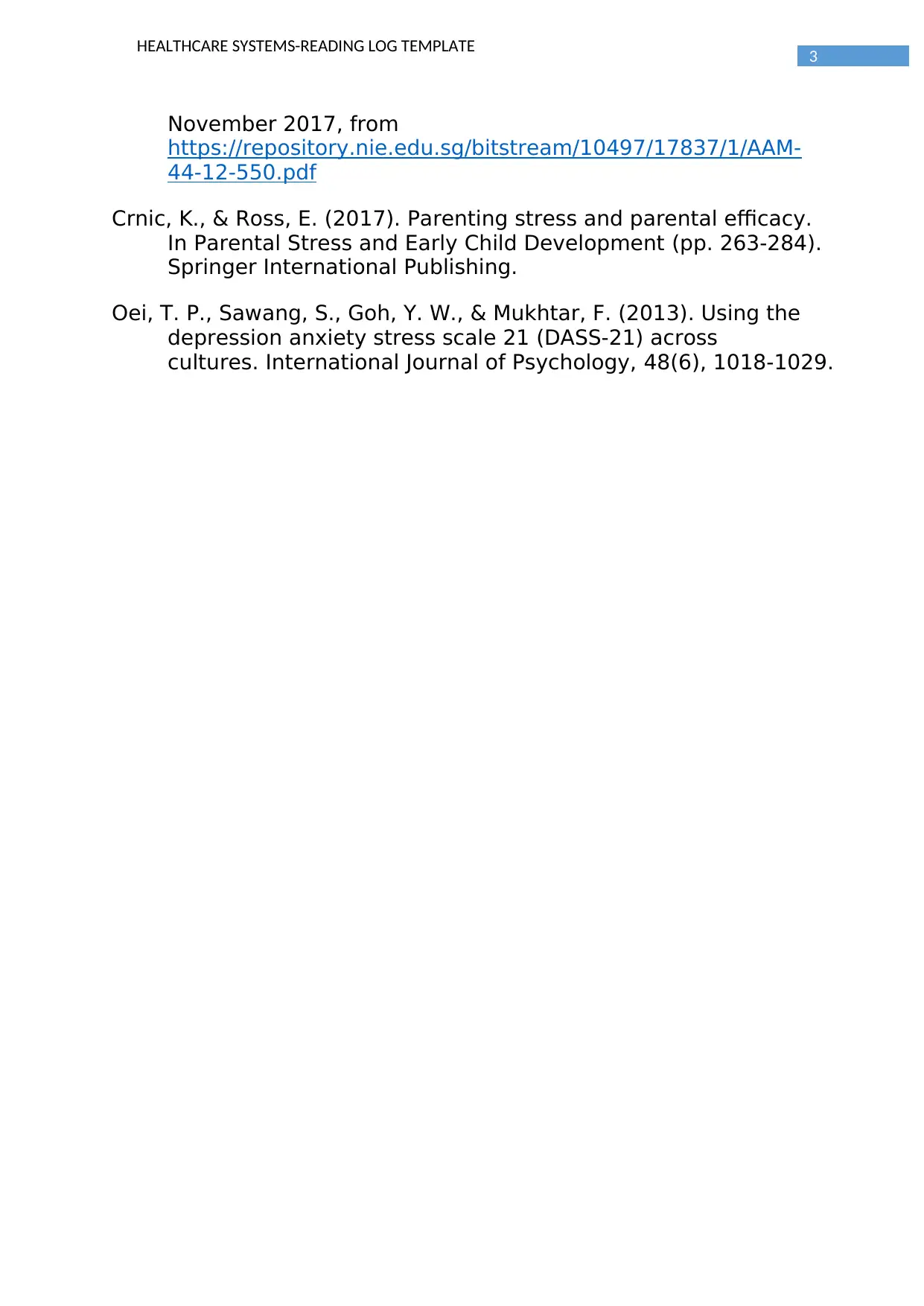Healthcare Systems Reading Log Template
VerifiedAdded on 2020/04/21
|4
|685
|192
AI Summary
This document provides a template for a reading log focused on healthcare systems. It guides students to analyze a specific research paper on preventative child healthcare in Singapore, examining its main thesis, methodology, findings, accuracy, reliability, validity, generalizability, and usefulness. Students are also asked to provide their agreement and disagreement with the paper's conclusions.
Contribute Materials
Your contribution can guide someone’s learning journey. Share your
documents today.

Running head: HEALTHCARE SYSTEMS-READING LOG TEMPLATE
HEALTHCARE SYSTEMS-READING LOG TEMPLATE
Name of the Student
Name of the University
Author Note
HEALTHCARE SYSTEMS-READING LOG TEMPLATE
Name of the Student
Name of the University
Author Note
Secure Best Marks with AI Grader
Need help grading? Try our AI Grader for instant feedback on your assignments.

1
HEALTHCARE SYSTEMS-READING LOG TEMPLATE
7304MED HEALTH CARE SYSTEMS - READING LOG TEMPLATE
Student Name:
Student Number:
Criterion Response to Criterion
Correct Citation (in
APA6 format)
(Chong et al., 2017)
What is the main
thesis of the paper
Preventative Child healthcare in
Singapore- the effect of the mental health,
anxiety and stress of caregivers on the
capacity to provide care.
What methodology
and method was
used and are the
main findings of the
work?
Qualitative Study was done based on
surveys and focus group discussions with
primary care givers. That is, how factors
like stress and anxiety, faced by the
primary caregivers to children with special
needs, can change the care giving
outcome.
How are you
assured of accuracy
within the paper
The study used qualitative method (survey
and discussions) and utilized Parenting
Daily Hassles Scale Brief COPE and
Depression Anxiety Stress scale (DASS)
(Crnic & Ross., 2017; Oei, Sawang, Goh &
Mukhtar., 2013).
How are you
assured of
Reliability of the
measurements
used in the paper
If repeated, the survey is most likely to
give similar results. The measurements for
identifying stress are also standardized,
and can be repeated independently,
thereby providing adequate reliability to
the study method.
How are you
assured of the
Validity of the
results
The measurements (COPE, DASS) are both
logically and factually sound and
independently verifiable. The validity is
also assured by the usage of surveys and
focus group discussions, thereby including
responses from the field, and also
independently verifiable.
HEALTHCARE SYSTEMS-READING LOG TEMPLATE
7304MED HEALTH CARE SYSTEMS - READING LOG TEMPLATE
Student Name:
Student Number:
Criterion Response to Criterion
Correct Citation (in
APA6 format)
(Chong et al., 2017)
What is the main
thesis of the paper
Preventative Child healthcare in
Singapore- the effect of the mental health,
anxiety and stress of caregivers on the
capacity to provide care.
What methodology
and method was
used and are the
main findings of the
work?
Qualitative Study was done based on
surveys and focus group discussions with
primary care givers. That is, how factors
like stress and anxiety, faced by the
primary caregivers to children with special
needs, can change the care giving
outcome.
How are you
assured of accuracy
within the paper
The study used qualitative method (survey
and discussions) and utilized Parenting
Daily Hassles Scale Brief COPE and
Depression Anxiety Stress scale (DASS)
(Crnic & Ross., 2017; Oei, Sawang, Goh &
Mukhtar., 2013).
How are you
assured of
Reliability of the
measurements
used in the paper
If repeated, the survey is most likely to
give similar results. The measurements for
identifying stress are also standardized,
and can be repeated independently,
thereby providing adequate reliability to
the study method.
How are you
assured of the
Validity of the
results
The measurements (COPE, DASS) are both
logically and factually sound and
independently verifiable. The validity is
also assured by the usage of surveys and
focus group discussions, thereby including
responses from the field, and also
independently verifiable.

2
HEALTHCARE SYSTEMS-READING LOG TEMPLATE
Criterion Response to Criterion
Can the findings be
generalized to the
wider community?
Same study can be generalized to be
applied to a wider community, in
Singapore or other countries.
Describe what you
agree with and/or
what you disagree
with in the paper.
Agreements: The strengths and capacity
of the primary care providers and family
should be increased to deal with children
with special health needs, to improve their
decision making and cognitive abilities.
Disagreement: The preventative
programs should be based beyond the
restrictive environment of the hospitals (or
Healthcare Facilities) to the more natural
environment of socially situated places,
for a sustained care program.
How useful (or not)
was the paper and
why have you
reached this
conclusion?
The paper was very helpful in emphasising
decision making and cognitive capabilities
of the primary health givers for children
with special medical needs, to ensure an
effective treatment and recovery.
Extending support to this group can
further reduce the rate of infant mortality
in Singapore by ensuring the parents have
the ability to make the correct decisions
related to the healthcare of the children.
*Use the definitions provided in the assessment instructions for each criteria listed in the left hand
criterion column of this template to guide your response to the criterion.
**To calculate your word limit, please be advised that this template contains 100 words when blank
References:
Chong, W., Choo, H., Goh, E., Wee, P., Goh, W., & Chay, O.
(2017). Preventive Child Healthcare in Singapore: A Parents’
Well-Being Perspective. Repository.nie.edu.sg. Retrieved 9
HEALTHCARE SYSTEMS-READING LOG TEMPLATE
Criterion Response to Criterion
Can the findings be
generalized to the
wider community?
Same study can be generalized to be
applied to a wider community, in
Singapore or other countries.
Describe what you
agree with and/or
what you disagree
with in the paper.
Agreements: The strengths and capacity
of the primary care providers and family
should be increased to deal with children
with special health needs, to improve their
decision making and cognitive abilities.
Disagreement: The preventative
programs should be based beyond the
restrictive environment of the hospitals (or
Healthcare Facilities) to the more natural
environment of socially situated places,
for a sustained care program.
How useful (or not)
was the paper and
why have you
reached this
conclusion?
The paper was very helpful in emphasising
decision making and cognitive capabilities
of the primary health givers for children
with special medical needs, to ensure an
effective treatment and recovery.
Extending support to this group can
further reduce the rate of infant mortality
in Singapore by ensuring the parents have
the ability to make the correct decisions
related to the healthcare of the children.
*Use the definitions provided in the assessment instructions for each criteria listed in the left hand
criterion column of this template to guide your response to the criterion.
**To calculate your word limit, please be advised that this template contains 100 words when blank
References:
Chong, W., Choo, H., Goh, E., Wee, P., Goh, W., & Chay, O.
(2017). Preventive Child Healthcare in Singapore: A Parents’
Well-Being Perspective. Repository.nie.edu.sg. Retrieved 9

3
HEALTHCARE SYSTEMS-READING LOG TEMPLATE
November 2017, from
https://repository.nie.edu.sg/bitstream/10497/17837/1/AAM-
44-12-550.pdf
Crnic, K., & Ross, E. (2017). Parenting stress and parental efficacy.
In Parental Stress and Early Child Development (pp. 263-284).
Springer International Publishing.
Oei, T. P., Sawang, S., Goh, Y. W., & Mukhtar, F. (2013). Using the
depression anxiety stress scale 21 (DASS-21) across
cultures. International Journal of Psychology, 48(6), 1018-1029.
HEALTHCARE SYSTEMS-READING LOG TEMPLATE
November 2017, from
https://repository.nie.edu.sg/bitstream/10497/17837/1/AAM-
44-12-550.pdf
Crnic, K., & Ross, E. (2017). Parenting stress and parental efficacy.
In Parental Stress and Early Child Development (pp. 263-284).
Springer International Publishing.
Oei, T. P., Sawang, S., Goh, Y. W., & Mukhtar, F. (2013). Using the
depression anxiety stress scale 21 (DASS-21) across
cultures. International Journal of Psychology, 48(6), 1018-1029.
1 out of 4
Related Documents
Your All-in-One AI-Powered Toolkit for Academic Success.
+13062052269
info@desklib.com
Available 24*7 on WhatsApp / Email
![[object Object]](/_next/static/media/star-bottom.7253800d.svg)
Unlock your academic potential
© 2024 | Zucol Services PVT LTD | All rights reserved.
